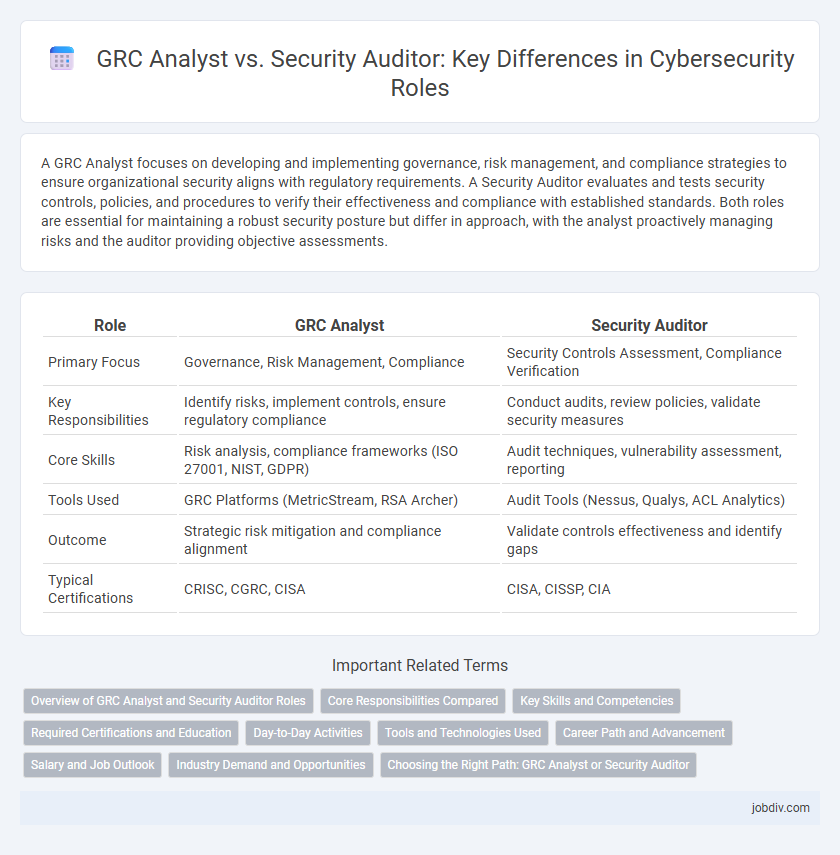A GRC Analyst focuses on developing and implementing governance, risk management, and compliance strategies to ensure organizational security aligns with regulatory requirements. A Security Auditor evaluates and tests security controls, policies, and procedures to verify their effectiveness and compliance with established standards. Both roles are essential for maintaining a robust security posture but differ in approach, with the analyst proactively managing risks and the auditor providing objective assessments.
Table of Comparison
| Role | GRC Analyst | Security Auditor |
|---|---|---|
| Primary Focus | Governance, Risk Management, Compliance | Security Controls Assessment, Compliance Verification |
| Key Responsibilities | Identify risks, implement controls, ensure regulatory compliance | Conduct audits, review policies, validate security measures |
| Core Skills | Risk analysis, compliance frameworks (ISO 27001, NIST, GDPR) | Audit techniques, vulnerability assessment, reporting |
| Tools Used | GRC Platforms (MetricStream, RSA Archer) | Audit Tools (Nessus, Qualys, ACL Analytics) |
| Outcome | Strategic risk mitigation and compliance alignment | Validate controls effectiveness and identify gaps |
| Typical Certifications | CRISC, CGRC, CISA | CISA, CISSP, CIA |
Overview of GRC Analyst and Security Auditor Roles
GRC Analysts focus on Governance, Risk, and Compliance by assessing organizational policies, identifying risks, and ensuring regulatory adherence to minimize security vulnerabilities. Security Auditors concentrate on evaluating the effectiveness of security controls and conducting audits to verify compliance with internal standards and external regulations. Together, these roles provide a comprehensive framework for managing risk and strengthening an organization's cybersecurity posture.
Core Responsibilities Compared
GRC Analysts focus on aligning security policies with regulatory requirements, risk management, and compliance monitoring to ensure organizational adherence to governance frameworks. Security Auditors primarily conduct systematic evaluations of security controls and processes to identify vulnerabilities and verify compliance with established standards such as ISO 27001, NIST, or PCI-DSS. While GRC Analysts emphasize strategic risk assessment and policy development, Security Auditors concentrate on detailed assessment and reporting of security posture through audits and control testing.
Key Skills and Competencies
GRC Analysts excel in risk assessment, policy development, and compliance management, leveraging skills in regulatory frameworks such as GDPR, ISO 27001, and NIST. Security Auditors demonstrate expertise in conducting security assessments, vulnerability analysis, and audit reporting, with proficiency in internal controls and audit standards like SOC 2 and COBIT. Both roles require strong analytical thinking, attention to detail, and knowledge of cybersecurity principles to effectively safeguard organizational assets.
Required Certifications and Education
GRC Analysts typically require certifications such as Certified in Risk and Information Systems Control (CRISC) and Certified Information Systems Security Professional (CISSP) along with a bachelor's degree in information technology, cybersecurity, or business administration. Security Auditors often pursue certifications like Certified Information Systems Auditor (CISA) and Certified Internal Auditor (CIA), complemented by education in accounting, information systems, or cybersecurity. Both roles benefit from strong knowledge of regulatory frameworks, but GRC Analysts focus more on risk management certifications while Security Auditors emphasize audit-specific credentials.
Day-to-Day Activities
GRC Analysts focus on continuous monitoring of governance, risk management, and compliance frameworks by assessing control effectiveness, updating risk registers, and coordinating policy implementation. Security Auditors perform periodic evaluations through conducting audits, reviewing security controls against standards such as ISO 27001 or NIST, and generating detailed compliance reports. Both roles require collaboration with IT and compliance teams, but GRC Analysts emphasize ongoing risk analysis while Security Auditors concentrate on formal assessments and audit findings.
Tools and Technologies Used
GRC Analysts primarily utilize integrated risk management platforms like RSA Archer, MetricStream, and ServiceNow GRC to streamline compliance tracking, risk assessment, and policy management. Security Auditors rely heavily on vulnerability scanners such as Nessus, Qualys, and penetration testing tools like Metasploit to identify and evaluate security weaknesses. Both roles leverage Security Information and Event Management (SIEM) systems like Splunk and QRadar for monitoring and analyzing security events in real-time.
Career Path and Advancement
GRC Analysts specialize in governance, risk management, and compliance frameworks, often advancing into roles like Risk Manager or Chief Compliance Officer by developing expertise in regulatory environments and enterprise risk strategies. Security Auditors focus on assessing organizational security controls and compliance, progressing towards Senior Auditor, Security Consultant, or Audit Manager positions with skills in technical assessments and audit methodologies. Career advancement for GRC Analysts typically emphasizes strategic policy development, while Security Auditors build deeper technical audit proficiency and operational security insights.
Salary and Job Outlook
GRC Analysts typically earn an average salary ranging from $75,000 to $110,000 annually, reflecting their role in governance, risk management, and compliance frameworks. Security Auditors command salaries generally between $70,000 and $105,000, driven by expertise in evaluating security controls and regulatory adherence. The job outlook for both positions remains strong, with GRC Analysts benefiting from growing demand for integrated risk management and Security Auditors seeing steady opportunities due to increasing cybersecurity regulations.
Industry Demand and Opportunities
GRC Analysts are in high demand across industries aiming to align governance, risk management, and compliance frameworks with regulatory standards, often leading to broader strategic roles. Security Auditors primarily focus on assessing and validating security controls and compliance, with steady opportunities in sectors requiring rigorous regulatory adherence such as finance, healthcare, and government. Market trends indicate growing opportunities for GRC Analysts driven by increasing regulatory complexities and organizational risk management needs, while Security Auditors maintain essential roles in operational security validation.
Choosing the Right Path: GRC Analyst or Security Auditor
Choosing the right path between a GRC Analyst and Security Auditor depends on your interest in strategic risk management versus hands-on compliance evaluation. GRC Analysts focus on aligning governance, risk, and compliance frameworks with business objectives, utilizing risk assessment tools and regulatory standards like ISO 27001 and NIST. Security Auditors specialize in conducting detailed security assessments, penetration testing, and ensuring adherence to policies through audit methodologies such as SOC 2 and HIPAA compliance.
GRC Analyst vs Security Auditor Infographic

 jobdiv.com
jobdiv.com